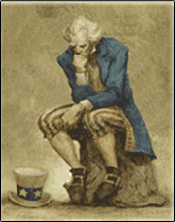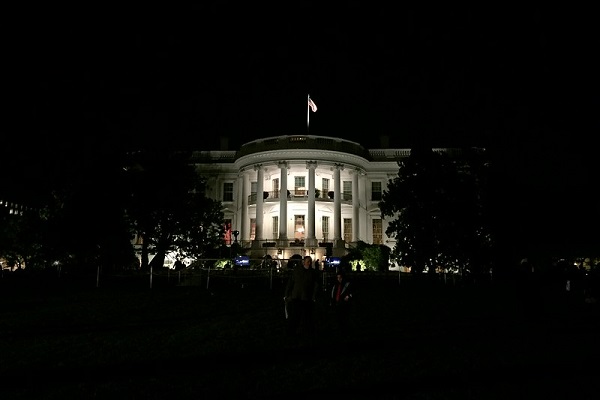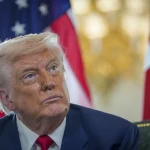
–>
June 8, 2023
Warfare requires deception. The federal government habitually lies to the American people. Consider that an admission that it sees itself at war with those it claims to serve.
‘); googletag.cmd.push(function () { googletag.display(‘div-gpt-ad-1609268089992-0’); }); document.write(”); googletag.cmd.push(function() { googletag.pubads().addEventListener(‘slotRenderEnded’, function(event) { if (event.slot.getSlotElementId() == “div-hre-Americanthinker—New-3028”) { googletag.display(“div-hre-Americanthinker—New-3028”); } }); }); }
You might have noticed that the word “propaganda” has been somewhat retired from polite conversation. Occasionally, some State-allied news corporation will apply the term to a public statement coming from inside Russia, but otherwise, the idea that governments promote falsehoods cloaked as official truths has quietly disappeared.
Instead, ordinary information enjoyed and shared among regular people is now targeted for classification. An alliance of national governments, international institutions, and propaganda engines disguised as disinterested nonprofits has sprung up to toss “unacceptable” thoughts into garbage piles for “mis-,” “mal-,” and “dis-” information trash bins. As with everything else in modern society, the cult of expertise has even given us “disinformation experts” to decide what knowledge belongs where.
The small coterie of “disinformation experts” recognized and promoted by governments then monitor what the common people are saying among themselves, cast their nets around anything “unacceptable,” and stigmatize those words and thoughts as deserving of censorship. Perhaps one day soon there will be academic degrees in “disinformation” or special licenses distinguishing State-approved professionals as qualified to tell the rest of us what is real. As a rule of thumb, if you want to know what kinds of knowledge governments fear their citizens possessing, look to the subjects that require numerous layers of authority validation before access is granted or titles are conferred. Now the knowledge that governments fear their citizens possessing is simply information outside their control.
‘); googletag.cmd.push(function () { googletag.display(‘div-gpt-ad-1609270365559-0’); }); document.write(”); googletag.cmd.push(function() { googletag.pubads().addEventListener(‘slotRenderEnded’, function(event) { if (event.slot.getSlotElementId() == “div-hre-Americanthinker—New-3035”) { googletag.display(“div-hre-Americanthinker—New-3035”); } }); }); }
In this way, officials have flipped the script on propaganda. Rather than the people calling out governments for their lies, governments pre-emptively defame their citizens as liars. How do governments know when their citizens are “lying”? Easy. They just isolate anybody who contradicts publicly announced official truths. Like a puff of smoke vanishing in the wind, government propaganda disappears because anyone who recognizes it as such is guilty of spreading “mis-,” “mal-,” or “dis-” information.
To find out what is “true,” good citizens are expected to respect the authority of government “disinformation specialists” who target what the people say but never what the government promotes. Accordingly, government propaganda flows forcefully yet invisibly because nobody is allowed to call it what it is. The liars have constructed a system in which only they may identify lies.
The question is how long Americans will silently consent to any government dedicated to public deception.
The longer I have been around to witness how small lies can cause tremendous damage, the more convinced I have become that there is no more precious calling than to seek, protect, and spread truth. Finding truth is often (if not always) difficult. Sometimes what we think is true turns out to be false, and we are forced to adjust our understanding of the world accordingly. Even when gold-tinted “truths” prove pyritic, the search for truth remains priceless.
One of the most effective ways of measuring a man’s (or government’s) character is not to decide whether he is right or wrong about some matter, but rather to determine whether he is committed to pursuing truth or eager to sacrifice it. A virtuous man will adjust his worldview when confronted with conflicting yet convincing evidence; an unethical man will push falsehoods, no matter how irrational or unreasonable.
The truth-seeker understands that the process of pursuing truth is valuable, even when it provides an incomplete understanding of the world. In contrast, those who push falsehoods embrace a lie that incomplete knowledge eliminates the possibility for truth. Honest people see the pursuit of truth as its own reward; dishonest people see its manipulation as a means for scamming honest people. When the government empowers itself to decide what is true and uses that authority to tell flagrant lies, it wages an information war against its citizens.
‘); googletag.cmd.push(function () { googletag.display(‘div-gpt-ad-1609268078422-0’); }); document.write(”); googletag.cmd.push(function() { googletag.pubads().addEventListener(‘slotRenderEnded’, function(event) { if (event.slot.getSlotElementId() == “div-hre-Americanthinker—New-3027”) { googletag.display(“div-hre-Americanthinker—New-3027”); } }); }); } if (publir_show_ads) { document.write(“
This war directed against Americans’ minds has been raging for quite some time. What is different today is its pace and brazenness. Lies about Russia collusion, COVID, vaccine effectiveness, climate change, Biden family corruption, impartial justice, biological sex, American history, border security, debt sustainability, crime rates, gun safety, banking solvency, military engagements, racial disparities, religious doctrine, Western civilization, childhood development, healthy obesity, government surveillance, hydrocarbon energy, human slavery, acclaimed literature, anthropology — no topic is off limits for those who manipulate the public for a living.
Increasingly, the question is not whether the government is lying, but rather how malicious its intentions are. Did bureaucrats mandate mRNA injections that were neither safe nor effective because they are bad at science? Because they needed an alarming reason to rig the 2020 election with mail-in ballots? As a means of rewarding pharmaceutical companies and the politicians they own with windfall profits? As an opportunity to accelerate the World Economic Forum’s “Great Reset“? As a way to condition people to think of property, free speech, and personal liberty as “selfish” and instead submit to the national security surveillance State?
Are the climate change cultists committed to taking over farms and ending hydrocarbon fuels because they are too dumb to understand weather patterns, solar and geothermal energies, and chemistry? Because they are committed communists who believe in global government and command-and-control economies? Because they wish to induce instability and famine that will depopulate the planet?
Do extraterrestrial UFO stories confirm that the government has long covered up an important truth, or are they hoaxes meant to distract the public from something else?
Only the “disinformation experts” know.
Government monopolies over “truth” are evil. They elevate “narratives” over news. They protect the politician’s spin over facts. They champion the bureaucracy’s needs over the public’s. They preserve the State’s power at the expense of the people’s. Whenever governing authorities articulate “official truths,” it means the actual truth is being smothered. Whenever governments claim the need to control information, it means that they are losing control over their citizenry. Propaganda and censorship are tools of the weak. They are the last resort of political systems no longer capable of successfully competing in the marketplace for ideas.
There is no kind of government immune from corruption. All eventually tilt toward tyranny. The best we may do to protect ourselves is to construct safeguards against this inevitability. Separation of powers, limited federal authority, diffuse state and local jurisdiction, expansive personal liberties, and effective self-defense all serve to thwart government-sanctioned injustice. Perhaps no more important safeguard exists than a strong cultural commitment to freedom of speech — long a centerpiece of American civic virtue precisely because it serves as an inherent check against State-imposed religion, ideology, and propaganda.
Every one of these counterweights to government corruption recognizes that public officials cannot be trusted. The U.S. Constitution and Bill of Rights are predicated on a pessimistic reality that government power attracts cutthroats and liars who must be kept under constant scrutiny, lest their deviant natures be let loose. No matter how principled a nation’s founders, criminals will eventually run the government. Written constitutions restraining those criminals’ worst impulses represent humanity’s best efforts at minimizing the damage.
Government apparatchiks are therefore the absolute last group of people in any society who should be trusted with deciding what is true. Their vested interest in maintaining power distorts their reasoning and their fiendish natures preclude honest observation. In a just society, at least half would be serving time in prison for insider trading, criminal negligence, misappropriation of funds, or dereliction of duty. Instead, we let them print money, sell votes, play with nukes, and lock up their political enemies.
No government at war with its people can long endure. Make no mistake, any government that embraces lies and deploys public deceptions is most definitely at war.

Image: NASA Goddard Space Flight Center via Flickr, CC BY 2.0 (cropped).
<!–
–>
<!– if(page_width_onload <= 479) { document.write("
“); googletag.cmd.push(function() { googletag.display(‘div-gpt-ad-1345489840937-4’); }); } –> If you experience technical problems, please write to helpdesk@americanthinker.com
FOLLOW US ON
<!–
–>
<!– _qoptions={ qacct:”p-9bKF-NgTuSFM6″ }; ![]() –> <!—-> <!– var addthis_share = { email_template: “new_template” } –>
–> <!—-> <!– var addthis_share = { email_template: “new_template” } –>




